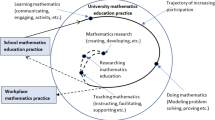Abstract
Using narrative inquiry as a research method, four mathematics and mathematics education faculty members explored the integration of theoretical perspectives into their personal narratives as they developed a community of practice. Initially their focus was strictly on improving their students’ mathematical knowledge. As their community of practice matured, however, their work took on a larger meaning as they contributed to the institution’s strategic goal of raising the annual dollar amount of external funding and to the development of their personal and collective identities. This unusual level of inter-departmental collaboration has been recognized by the institution’s highest administrators, who have called upon its members to develop new, collaborative partnerships with regional school districts and community colleges.
Similar content being viewed by others
References
Clandinin, D. J., & Connelly, F. M. (2000). Narrative inquiry: Experience and story in qualitative research. San Francisco, CA: Jossey-Bass.
Clandinin, D. J., & Rosiek, J. (2007). Mapping a landscape of narrative inquiry: Borderland spaces and tensions. In D. J. Clandinin (Ed.), Handbook of narrative inquiry: Mapping a methodology (pp. 35–75). Thousand Oaks, CA: Sage.
Foord, K. A., & Haar, J. M. (2008). Professional learning communities: An implementation guide and toolkit. Larchmont, NY: Eye on Education.
Leveille, N., Quander, J., & Orta, K. (2014, November). Developing a research based practitioner for today’s classrooms. Paper presented at the NCTM Regional Conference & Exposition, Houston, Texas.
Leveille, N., Quander, J., Redl, T., Orta, K., Carlton, K. , Sack, J. (2015, September). Developing research practitioners: Senior projects for pre-service teachers. Paper presented at the 13th International Conference of the Mathematics Education for the Future Project: Mathematics Education in a Connected World, Catania, Sicily, Italy.
Moore, J. A., & Carter-Hicks, J. (2014). Let’s talk! Facilitating a faculty learning community using a Critical Friends Group approach. International Journal for the Scholarship of Teaching & Learning, 8, 1–17.
Moyer-Packenham, P. S., Kitsantas, A., Bolyard, J. J., Huie, F., & Irby, N. (2009). Participation by STEM faculty in mathematics and science partnership activities for teachers. Journal of STEM Education: Innovations & Research., 10(2), 17–36.
Pinnegar, S., & Daynes, J. G. (2007). Locating narrative inquiry historically: Thematics in the turn to narrative. In D. J. Clandinin (Ed.), Handbook of narrative inquiry: Mapping a methodology (pp. 3–34). Thousand Oaks, CA: Sage.
Quander, R., & Sack, J. (2014, February). Retaining and supporting non-traditional future high school mathematics teachers. Paper presented at the 18th annual conference of the Association of Mathematics Teacher Educators, Irvine, CA.
Redl, T., Quander, R., Leveille, N., Sack, J., & Connell, M. (2013, January). Recruiting and preparing mathematics majors for Houston-area classrooms: The University of Houston-Downtown Noyce Mathematics Teacher Scholarship program . Paper presented at the Joint Mathematics Meeting of the Mathematical Association of America and American Mathematics Society, Baltimore, MD.
Sack, J. (2014, June.) This is not your grandfather’s geometry. Paper presented at the NSF Robert Noyce Teacher Scholarship Program Conference, Building Connections for Revitalizing STEM Education in High Need Schools, Washington, D.C.
Schwab, J. J. (1962). The teaching of science as enquiry. In J. J. Schwab & P. F. Brandwein (Eds.), The teaching of science (pp. 3–103). Cambridge, MA: Harvard University Press.
Schwab, J. J. (1969). The practical: A language for curriculum. School Review, 78, 1–23.
Schwab, J. J. (1971). The practical: Arts of eclectic. School Review, 79, 493–542.
Schwab, J. J. (1973). The practical 3: Translation into curriculum. School Review, 83, 501–522.
Schwab, J. J. (1983). The practical 4: Something for curriculum professors to do. Curriculum Inquiry, 13, 239–265.
Wenger, E. (1998). Communities of practice learning as a social system. Retrieved from http://www.co-i-l.com/coil/knowledge-garden/cop/lss.shtml
Wenger, E., McDermott, R., & Snyder, W. M. (2002). Cultivating communities of practice: A guide to managing knowledge. Boston, MA: Harvard Business School Press.
Zhang, X., McInerney, J., & Frechtling, J. (2011). Effect of STEM faculty engagement in the Math and Science Partnership Program. School Science and Mathematics, 111, 274–287.
Acknowledgment
The preparation of this article was supported in part by the National Science Foundation under Grant No. 1136222. The authors wish to thank Michael Connell for his thoughtful feedback during the writing process.
Author information
Authors and Affiliations
Corresponding author
Rights and permissions
About this article
Cite this article
Sack, J., Quander, J., Redl, T. et al. The Community of Practice among Mathematics and Mathematics Education Faculty Members at an Urban Minority Serving Institution in the U.S.. Innov High Educ 41, 167–182 (2016). https://doi.org/10.1007/s10755-015-9340-9
Published:
Issue Date:
DOI: https://doi.org/10.1007/s10755-015-9340-9




